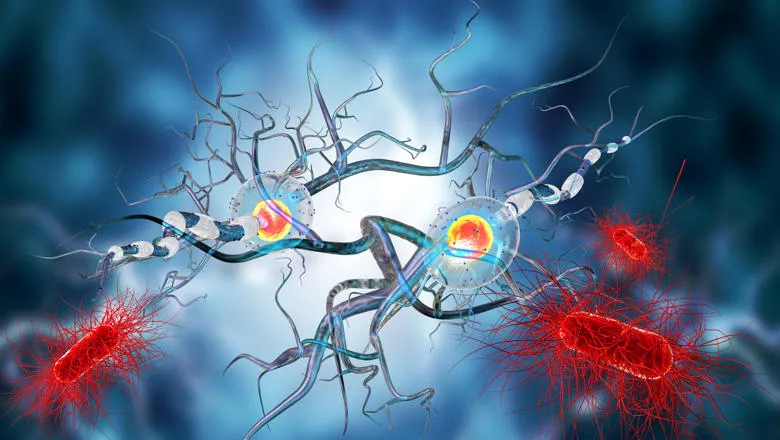15 September 2025
Immune system changes affecting sensory nerves could cause fibromyalgia
Fibromyalgia might be caused by changes in the body’s immune system which alter nerve cells in the skin.

A study published in Brain by researchers at King’s College London provides further evidence that fibromyalgia is a disease of the immune system, rather than the brain.
Fibromyalgia is characterised by symptoms including unrelenting pain and debilitating fatigue. The condition is hard to diagnose, with no specific diagnostic test available, and with symptoms that overlap with several other conditions. It is estimated to affect 1 in 20 people in the UK1 and there is currently no cure.
Alongside chronic pain and fatigue, many people with fibromyalgia experience a range of sensory abnormalities.
Lead author Mathilde Israel, Research Associate at the Institute of Psychiatry, Psychology & Neuroscience, King’s College London, said: “People report a range of sensory abnormalities such as pins and needles, tingling, sensitivity to different fabrics or extreme sensitivity to cold like when they open the fridge or step out on a winter’s day – which impact on quality of life.”
The King’s researchers, alongside University of Liverpool collaborators, believe that these symptoms are caused by changes in nerve cells in the body, specifically ‘mechanoreceptors’, which are specialised cells that send signals in the body to detect touch.
Previous research led by King’s had already linked these antibodies with chronic pain and tiredness in fibromyalgia, but this is the first time their role in sensory abnormalities has been studied.
Mathilde Israel said: “We all have antibodies in our blood that perform vital functions, keeping us healthy and free from illness. In some people, there are antibodies that are known to cause neurological disease, for example in the disease myasthenia gravis.
“In fibromyalgia, this avenue of research is in its early stages. We wanted to explore whether sensory abnormalities could be caused by circulating antibodies in the body, already linked to chronic pain and tiredness.”
To investigate this theory, the scientists isolated antibodies from patients with fibromyalgia. These antibodies were injected into mice and their behaviour analysed. Those that had been administered the antibodies showed increased sensitivity to light touch and cold. Those that had been injected with antibodies from healthy participants were unaffected.
By recording electrical signals from nerves, the team showed that fibromyalgia antibodies altered ‘firing’ of mechanoreceptors, making many of these touch sensors also respond to cold temperature. The scientists then translated these findings to humans.
Through recording electrical nerve signals, the scientists discovered that the mechanoreceptors in people with fibromyalgia also responded more often to cold compared to healthy, pain-free individuals. They believe that these changes, caused by antibodies, are responsible for the sensory abnormalities that people with fibromyalgia experience.
Mathilde Israel added: “Our research argues against the commonly held belief that symptoms in fibromyalgia are caused by changes in the brain, providing evidence that the cause of the disease lies in the immune system.
“At this stage, we cannot say exactly what the difference between the antibodies of healthy participants and fibromyalgia patients are, just that they are different. Exactly what underlies the change to antibodies also remains unknown.”
Further research into these specific antibody changes might help to devise diagnostic tests and targeted drug treatment.
Professor Lucy Donaldson, Director of Research at Versus Arthritis, added: "We are very proud to be funding research such as this that will make a real difference to the millions of people living with fibromyalgia and chronic pain. We can only start to tackle the impact of chronic pain experienced by people living with conditions like fibromyalgia, through better understanding of how changes in nerves lead to altered sensations that make life so difficult for them.
“This study also shows just how important it is to work with, and listen to people with lived experience of pain, to make sure we're asking and answering the right questions. By listening to peoples’ experiences, the researchers could better target their work to understand how antibodies produced against our own tissues might lead to unpleasant sensory changes like tingling, pins and needles, and sensitivity to cold temperatures in fibromyalgia. This research gives us important clues about the underlying causes of, and possible future treatments for fibromyalgia.”
